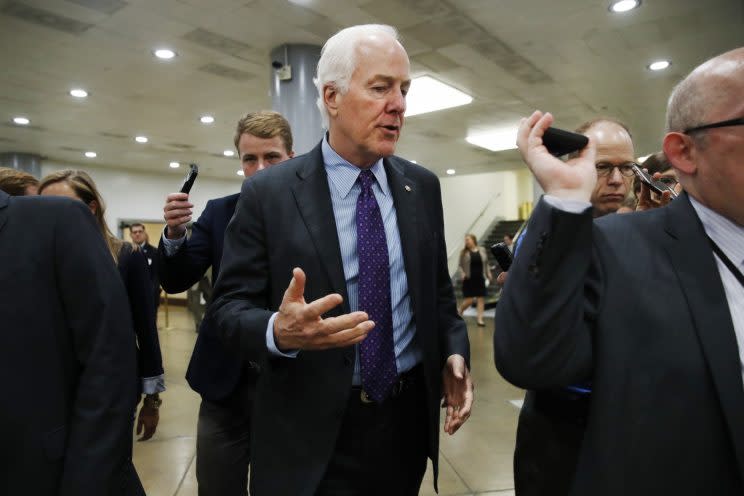Senate health care plan B, or maybe C or D, takes shape, as conservative bloc hardens stand

As conservative GOP senators issue ultimatums about health care legislation, moderates have begun to work on a backup plan should a repeal-and-replace of Obamacare fail.
Sen. Mike Lee, R-Utah, said during a news conference Tuesday that he cannot support the Senate bill in its current form, but has supported an amendment proposed by Sen. Ted Cruz, R-Texas, that, if adopted, would earn his vote. The amendment would allow health care companies to offer plans that don’t cover the essential benefits provided by Obamacare in a state as long as they offer one plan that does in that same state. The proposal has been criticized by the conservative National Review and would be unlikely to bring aboard some Republican critics of the Better Care Reconciliation Act, such as Sens. Susan Collins of Maine and Dean Heller of Nevada.
On Wednesday morning, Sen. Rand Paul, R-Ky., published an op-ed on Breitbart explaining why he wouldn’t vote for the Senate’s current plan, sounding even further away from a “yes” vote than Lee. Paul wrote that the current Republican legislation does not do enough to repeal Obamacare and, in his opinion, expands and codifies parts of the law that his party has campaigned against in four election cycles.
“Doesn’t sound much like repeal to me,” wrote Paul. “One might even argue it’s worse than Obamacare-lite because it actually creates a giant superfund to bail out the insurance companies — something even the Democrats feared to do.”
“The new bill is the same as the old bill, except it leaves in place more taxes,” Paul added later Wednesday on a media call.
Senate Majority Leader Mitch McConnell, R-Ky., can afford to lose only two votes from his 52-person caucus, which would allow Vice President Pence to break a 50-50 tie.
Sen. John Cornyn of Texas, the Republican whip, said Tuesday that the Senate plan would likely maintain the surtax imposed to fund Obamacare — on investment income above a $250,000 threshold — and would also provide additional funding for opioid treatment. But critics have said the increased addiction-treatment funding would not offset the measure’s cuts to Medicaid, which covers addiction help for low-income Americans.

Cornyn has said there will be a Congressional Budget Office score Thursday and a vote next week. But there is still no obvious way for McConnell to thread the needle between the conservative bloc of Lee, Cruz and Paul and others who have expressed reservations about the bill, and the other side, including Collins, Heller, Jerry Moran of Kansas, Rob Portman of Ohio, Shelley Moore Capito of West Virginia and Bill Cassidy of Louisiana.
Should the legislation fail, a bipartisan backup plan to stabilize Obamacare markets is starting to form. Bloomberg reported Wednesday that a group including Collins and Sens. Ron Johnson, R-Wis., Lindsey Graham, R-S.C., Bill Nelson, D-Fla., and Tom Carpers, D-Del., have been discussing a plan that would involve payments for insurers to keep premiums from rising drastically for high-risk pools. Senators said they would be seeking support from governors, many of whom have been critical of proposed Republican health care plans.
“We don’t agree with Obamacare, but recognize the fact that these markets are collapsing; insurance companies need it to provide the certainty of how they’re going to price the 2018 premiums,” said Johnson. (A study released by Kaiser in June found that the markets were not collapsing at the rate suggested by Republicans and that “insurer financial results show no sign of a market collapse.”)
A bill that won at least some Democratic support could pass even if Cruz, Lee and Paul hold out against it. But the issue would then go back to the House, whose own version of health care reform, the American Health Care Act, was very different.
_____
Read more from Yahoo News:


